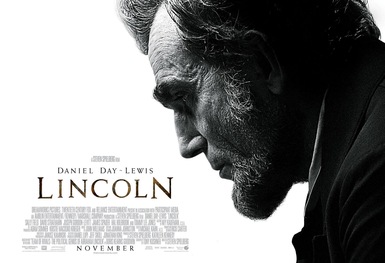The entire roundtable on Django Unchained is here.
____________________
I made the odd choice to see both Django Unchained and Lincoln during the same evening, which made for an interesting resonance between the two films. On the one hand, you’ve got a grim-but-lightweight meditation on slavery and the awful-yet-exhilarating things people did to get out from under its thumb, and on the other, you’ve got a more serious treatment of the matter in Quentin Tarantino’s blaxploitation revenge thriller. I kid, of course, but it’s notable that while Lincoln is supposedly a serious, highbrow take on what had to be done to end slavery in the United States, Django is much more effective in evoking its horrors, putting a more personal face on the issue and really getting the viewer on the side of the oppressed. Or maybe that’s just my impression due to the juxtaposition of the two, along with my own personal tastes for the relative filmic styles of Tarantino and Steven Spielberg.
By the way, unlike some commentators around these parts, I don’t really have any antipathy toward Spielberg, and I generally like his movies; they’re slick, commercial productions that are almost always put together marvelously, clicking along like well-oiled machines that are constructed in such a way that their clever workings are exposed for all to see so we can be fascinated at their intricacies. This is fine when it comes to entertainments, but when applied to serious subjects, the self-satisfaction can become extremely irksome, with messages pounding viewers over the head with their obviousness, characters mawkishly affirming proper virtues to those around them almost up to the point of turning toward the camera to give some extra pointers to the folks at home, and the ever-present John Williams score swelling grandly to remind everyone of the gloriousness of what we’re seeing. It’s oppressive, a sensibility that, in seeking to highlight the magnificence of the events depicted, smothers them in “importance”, making sure nothing is misinterpreted.
That said, Lincoln certainly isn’t terrible, and while some of Spielberg’s schmaltzy impulses are on display, they can’t obscure a wonderful performance by Daniel Day-Lewis and some fascinating looks at all the behind-the-scenes maneuvering, dealmaking, and outright lying that had to be done in order to accomplish something worthwhile in the dirty business of United States politics. It’s not a movie for idealists, since even with all of the appeals to the rightness of the cause of outlawing slavery, the message seems to be that one has to sacrifice one’s ideals in order to accomplish anything of worth. The big moment in this regard comes when Thaddeus Stevens (as played by Tommy Lee Jones), a fiery abolitionist who had long spoken of a belief in the equality of all men, gives a speech in which he insists that he only supports equality in terms of the law, rather than in a moral sense, and it’s presented as a triumphant moment, with swelling music and triumphant reactions from his fellow supporters of the 13th Amendment. It’s a surprisingly cynical scene, but Spielberg has to include a moment in which Mary Todd Lincoln’s black servant lady leaves the chambers in tears, in case we get so carried away by the speech that we also adopt the belief that while slavery is evil, freed slaves really shouldn’t be allowed to vote (and not women either, since that also gets a mention in another on-the-nose moment).

